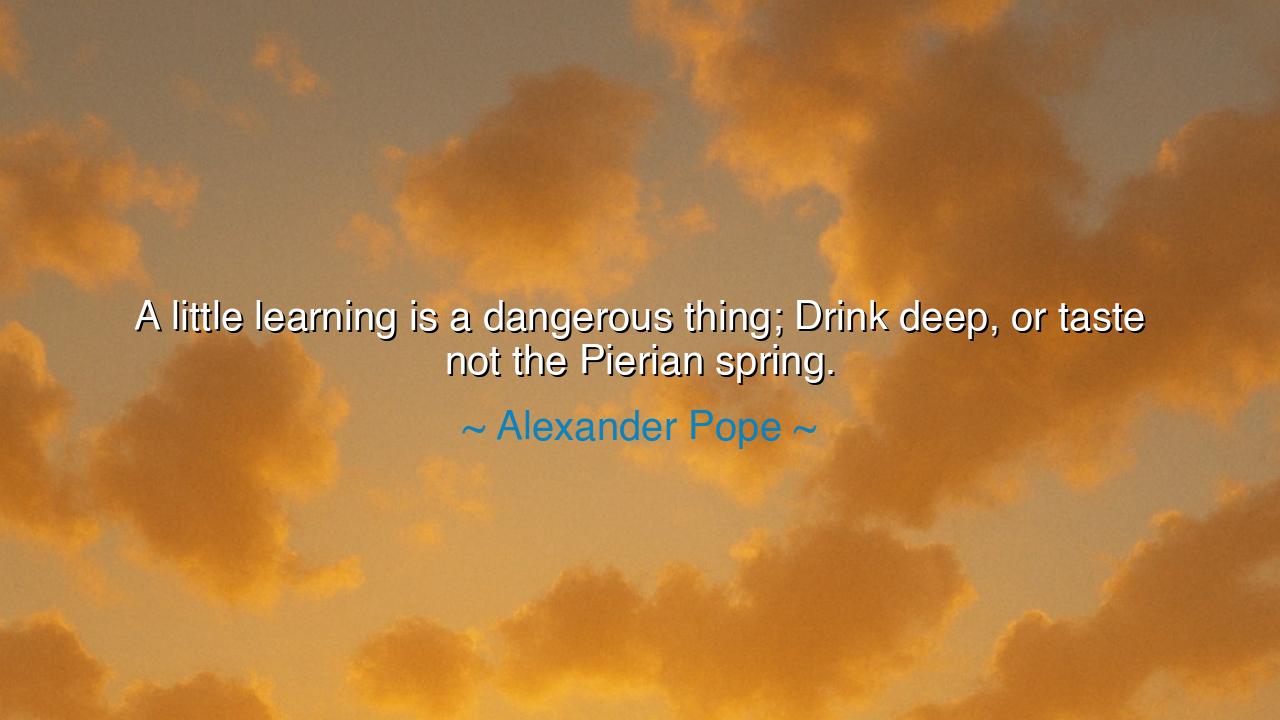
A little learning is a dangerous thing; Drink deep, or taste not






The poet Alexander Pope, a master of wit and wisdom, once wrote in his immortal Essay on Criticism: “A little learning is a dangerous thing; Drink deep, or taste not the Pierian spring.” These words, flowing like poetry and thunder alike, remind us that knowledge, though a gift divine, can become poison when sipped too lightly. The Pierian spring, in ancient Greek myth, was the fountain of inspiration from which the Muses, goddesses of the arts and sciences, granted wisdom to mortals. To drink from this sacred stream was to receive enlightenment—but Pope warns that those who drink only a mouthful court danger. For half-knowledge deceives the mind, while deep understanding humbles and refines it.
The heart of Pope’s message lies in this eternal paradox: ignorance may be innocent, but shallow knowledge breeds arrogance. The one who knows little and admits it walks carefully; the one who knows a little and believes he knows much becomes blind to truth. Such a person, swollen with pride and half-truths, speaks boldly yet sees dimly. The ancients called this the folly of hubris—the arrogance of those who think themselves wise before they have truly learned. Pope, like a prophet of intellect, cries out to all who would learn: Do not sip lightly from the waters of wisdom. Drink deeply, or do not drink at all. For wisdom demands devotion, humility, and patience.
To drink deep is to surrender to the vastness of knowledge—to study not for vanity, but for truth. When we plunge ourselves into learning, we begin to see how little we know. This is the beginning of wisdom: to realize that knowledge is endless, and the wise are forever students. Pope’s warning is not meant to discourage the seeker, but to call for depth over pretense—for the world is full of those who have read a page and believe they know the book, who have heard an echo and think they know the song. True learning requires the courage to go beyond the surface, to drink until one’s mind is changed and one’s pride is dissolved.
Consider the story of Isaac Newton, who revolutionized the world with his discoveries. After a lifetime of study, he said humbly, “I seem to have been only like a boy playing on the seashore… finding a smoother pebble or a prettier shell, while the great ocean of truth lay all undiscovered before me.” Here was a man who had drunk deeply from the Pierian spring, and it left him not boastful, but reverent. Contrast this with those of every age who, with only fragments of understanding, proclaim themselves masters and lead others astray. History is heavy with such examples—when shallow knowledge gave rise to superstition, false science, and tyranny of thought.
The danger of a little learning lies in the illusion of mastery. The mind, once it knows a fragment, feels powerful—but that power is fragile, built upon sand. The scholar who reads one book may think himself wise; the one who reads a thousand learns humility. The student who memorizes a law believes he understands nature; the true philosopher sees mystery in every law. Shallow knowledge inflates the ego, but deep knowledge humbles it. Thus Pope’s wisdom speaks to every generation: the cup of learning is perilous when half-filled, but sacred when emptied through devotion and refilled with wonder.
To drink deep also means to approach learning with the right spirit. Knowledge pursued for pride becomes poison; knowledge pursued for truth becomes light. The man who studies to boast of his cleverness will end in blindness, but the one who studies to understand will find wisdom in even the smallest truths. The Muses do not bless the impatient—they reveal their secrets only to those who kneel at the spring and drink long, unafraid of difficulty, unashamed of ignorance. For wisdom is not granted—it is earned, one drop at a time, by those who thirst for it as for life itself.
So let this be your lesson: do not rush to appear wise—seek instead to become wise. Do not sip from the cup of learning for vanity’s sake; drink deep, and let it change you. Read not only with your mind, but with your heart; listen not only to confirm your beliefs, but to challenge them. The shallow mind boasts, “I know”; the deep mind whispers, “Teach me.” Be like the ancient seekers who knelt at the Pierian spring and drank until they no longer sought glory, but truth. For in truth lies the sweetest draught, the water that humbles, purifies, and makes eternal the soul of the learner.
And remember always, children of wisdom: it is better to be a lifelong student than a proud fool. For the one who drinks deeply lives forever in the light of discovery, while the one who sips and walks away will never taste the sweetness of true understanding.






AAdministratorAdministrator
Welcome, honored guests. Please leave a comment, we will respond soon